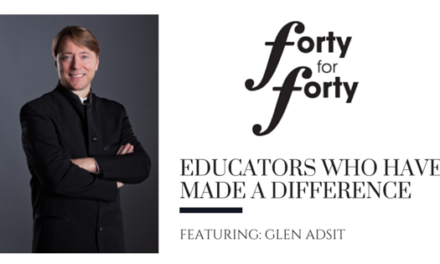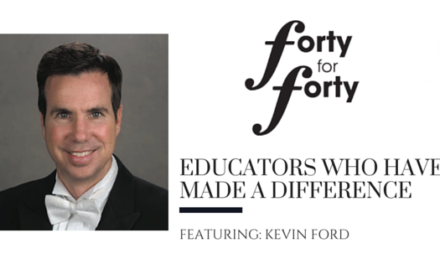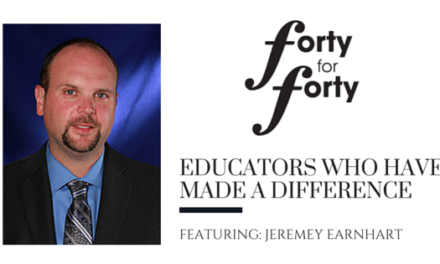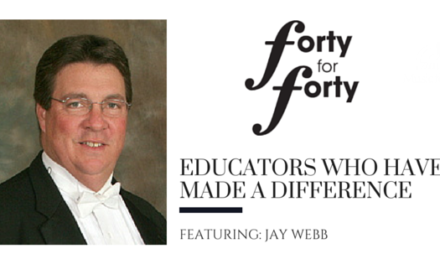In celebration of Music for All’s 40th Anniversary in 2015, we are featuring profiles of music educators who have made a difference in Music for All and in band and orchestra education. In this post we feature a band director who currently participates in all of Music for All’s programs and makes it his personal mission to help educate other directors about them as well.

David Aydelott is the Director of Bands at Franklin High School in the Williamson County Tennessee School District. During his tenure at those schools, students distinguished themselves on the marching field, the concert stage, and in individual and chamber settings. A recipient of the National Band Association’s Certificate of Merit and the Citation of Excellence, Aydelott is President of the Middle Tennessee School Band and Orchestra Association, past Band Chair for the Tennessee Music Education Association and has served two terms on the Executive Board of the MTSBOA. Mr. Aydelott is an elected member of Phi Beta Mu International School Bandmaster Fraternity and holds membership in MTSBOA, Tennessee Music Educators Association, National Association for Music Education, Tennessee Bandmasters Association, and Professional Educators of Tennessee. In December of 2014, Aydelott was presented as a John Philip Sousa Foundation Laureate of the Bandworld “Legion of Honor.”
How long have you been teaching?
This is my 24th year.
Where do you teach now?
I’m the band director at Franklin High School in the Williamson County, Tennessee District.
Where have you taught in the past?
I taught four years at Lexington High School, six years with Jo Ann Hood at John Overton High School, five years at Ravenwood High School (the first five years of the school’s existence), and this is my ninth year at Franklin.
Where did you go to college? What degrees do you earn?
I have a BM in Instrumental Music Education from Middle Tennessee State University.
What is one thing you’d say to a new band director who asks you “what is the one thing you wish someone had told you just starting out?”
Impossible to list only one, so I’ll list 5.
1. Focus on the experience of the kids, not your own career. When you’re starting out, you want to prove to your friends and mentors that you know what you’re doing, and you tend to be focused on yourself. But the way to do a good job is to take the focus off your own goals, accomplishments and actions, and look at what your students are doing. It’s not about how good of a time you’re having, but what your students do in rehearsal, how they feel about your program, and if their experience is worth what you ask of them. When the students are learning and happy, all the other elements take care of themselves.
2. Surround yourself with people that lift you up, not drag you down. Choose the right people to spend your life with, those who value this strange profession that we’re engaged in. That doesn’t mean that these people should always agree with you, in fact, it’s good when they don’t. But as long as they share your vision of what music education can be, it works out. I’m lucky enough to have found my wife Renee early in my career, and she has been a true blessing!
3. Seek national level professional development. This sounds a little campy, but my career changed in 2008 when I began attending the MFA Summer Symposium. Being around the people in our profession who are the “guiding lights” gave me perspective and raised my own expectations that I could improve as a teacher.
4. To avoid burnout, keep music close to you. It’s easy to get bogged down in all the administrative aspects of what we do, so go back to what your original “hook” was, your own musical experience. Go to concerts, listen to music that inspires you, and remember the joy that a musical life brings. One of my good friends and current band boosters always says regarding the superfluous, “It’s in the noise.” Don’t let the urgent and non-musical issues affect your ability to pass on that “hook” to your students.
5. Have a plan. Don’t just do “band things” without thought. Have a reason for what you do, whether it’s how to construct your band budget or what’s on the docket for this week’s rehearsals. Get into the nitty-gritty, especially your values and score study, and make a plan for your students’ success.
Tell us about your participation with Music for All and Bands of America.
Franklin is relatively new to Music for All events. The first event we participated in was the 2008 Summer Symposium. Since then, we’ve been a participant in every program that Music for all/Bands of America offers. The best thing about these past seven years is the relationships that our Franklin students have forged with students from other bands across the nation.
What are some of the highlights and memorable moments from your experiences related to Music for All/Bands of America?
- Shedding tears with our students
- Being around such great people at Summer Symposium
- Having three groups perform at the Music for All National Festival including our Wind Ensemble and Percussion Ensemble in 2013 and a Chamber Group in 2015
- Broken Arrow’s band applauding us during our first performance at Grand National Championships
- Seeing my oldest daughter Katherine perform in the 2009, 2010, and 2011 Honor Ensembles at the Music for All National Festival
- Getting to medal my youngest daughter Meredith
- Growing the Tennessee director contingent at Summer Sympsoium from one (me) to nearly 20 during this past year
What would you like to see MFA focus on or accomplish in the next 40 years?
I’m from a very small town in Tennessee, so the rural school initiative is very appealing to me. I hope that Music for All continues to find a way to reach students from rural and urban areas that may not be a part of a strong program. Those kids deserve positively life-changing experiences, too.



